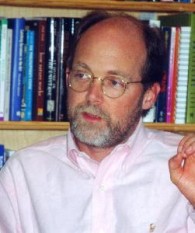Understanding the full scope of the Great Commission…

Only a fraction of the Church’s potential is being utilized for the task of bearing witness “to the love, grace, mercy, and truth of Christ.” By analogy, today’s Church is like the basketball team that leaves its center and point guard on the bench. All members are not engaged in the task of bearing witness to the full scope of the Gospel.
Part of the problem is a problem of leadership, according to sociologist James Davison Hunter. This dilemma is particularly momentous at our cultural moment when the challenges to Christian witness are “formidable to say the least.”
What has been missing is a leadership that comprehends the nature of these challenges and offers a vision of formation adequate to the task of discipling the church and its members for a time such as ours. By misreading the nature of the times and by focusing so much energy and resources on politics, those who have claimed the mantle of leadership have fixed attention on secondary and tertiary problems and false solutions.
If all of God’s people are called to bear witness to His redemptive work, what should this “vision of formation” look like? For starters, Hunter suggests a fuller understanding of the Great Commission. Formation is “nothing more or less than the pursuit of the ‘Great Commission.’ It is the task of ‘making disciples,’ of being conformed to the image of Christ.”
But in some parts of the Christian community, the great commission is reduced to evangelism, to the making of converts. For other segments of the Christian community, formation is reduced to the practice of spiritual disciplines—daily prayer, scripture reading, attending worship services, etc.
Hunter acknowledges that evangelism and the practice of spiritual disciplines are critical to the Christian life. But he points out that Scripture teaches that there is more to formation than these two components.
In Christ’s own words, making disciples entails “teaching them to observe all things that [he] commanded [them]” (Matt. 28:19-20). Likewise, St. Paul describes the mature Christian in his letter to the new believers in Colossae as those who would be “filled with the knowledge of his will in all spiritual wisdom and understanding, so as to walk in a manner worthy of the Lord, fully pleasing to him, bearing fruit in every good work and increasing in the knowledge of God (Col. 1:9-10). Formation—the task of making disciples—is oriented toward the cultivation of faithfulness in the totality of life. To this end St. Paul and St. Timothy “proclaimed [Christ], admonishing and teaching everyone with all wisdom, so that we may present everyone complete in Christ” (Col. 1:28). St. Paul writes that he toiled and struggled at this task. Making disciples, or formation, then, requires intentionality and it entails the hard work of teaching, training, and cautioning believers with wisdom in the ways of Christ so that they are fit for any calling and any service to him.
Returning to the Great Commission, Hunter suggests a comprehensive interpretation of Jesus’s charge.
Jesus calls his followers to “go into all the world” (Mark 16:15). This, of course, has long been interpreted geographically—the call of missionaries to go to faraway places to proclaim the good news and to make disciples. But the great commission can also be interpreted in terms of social structure. The church is to go into all realms of social life: in volunteer and paid labor—skilled and unskilled labor, the crafts, engineering, commerce, art, law, architecture, teaching health care, and service. Indeed, the church should be sending people out in these realms—not only discipling those in these fields by providing the theological resources to form them well, but in fact mentoring and providing financial support for young adults who are gifted and called to these vocations.
Hunter’s broad interpretation of the Great Commission is neither new nor unique. Some sixty years ago the theologian Elton Trueblood said very much the same thing.
There is no good reason why the words of the risen Lord, ‘Go ye into all the world,’ may not be taken intensively as well as extensively. Usually we have interpreted this injunction in a geographical sense, but there is a deeper significance according to which they may mean that all phases of life—economics, political, cultural, and domestic—must be deeply penetrated. If our new order is to succeed in the recovery of the lost provinces, it must be a society of penetrators in common life, not people separated from it. … (Your Other Vocation, pp. 27-28)
Elton Trueblood would be very much in agreement with James Hunter’s sober conclusion.
When the church does not send people out to these realms [i.e., all realms of social life] and when it does not provide the theologies that make sense of work and engagement in these realms, the church fails to fulfill the charge to “go into all the world.”
James Davison Hunter’s comments may be found in To Change the World: The Irony, Tragedy, and Possibility of Christianity in the Late Modern World (pp. 226-227 and 256-257). To Change the World was discussed in a forum organized by the Ethics and Public Policy Center in 2010. The transcript of Hunter’s overview of the book and the following discussion is available here.


 April 15, 2013
April 15, 2013 







Hunter’s book is great and very prophetic. The task of proclaiming Christ’s Lordship in culture is enormous; and it is very discouraging when the local church is clueless in preparing its members for cultural penetration.
Doug Kennard